Relevant Overviews
- Communication Strategy
- Content Strategy
- Knowledge4Policy
- Online Strategy
- Online Community Management
- Social Media Strategy
- Content Creation & Marketing
- Online Architecture
- Digital Transformation
- Change & Project Management
- Blockchain, Crypto, NFTs etc
- Personal Productivity
- Innovation Strategy
- Communications Tactics
- Psychology
- Social Web
- Media
- Politics
- Communications Strategy
- Science&Technology
- Business
Overview: Online Strategy
How should your online presence be shaped?
Is your website working? Do first-time visitors understand what you do, and find the content they need, before clicking away? If not, should you tweak your site or build a new one?
Perhaps you should spend more resources on social, but to do what: engage your audience, convene a community, or simply broadcast your website content?
How can you do both so that your social media presence and your website work together? And what are you measuring, so that you continuously improve?
Need help? Get in touch.
More services: start with Communication strategy.
Relevant resources

these technologies ... kind of a denial-of-service (DoS) attack on the human will. Our phones are the operating system for our life. They keep us looking and clicking... wears down certain capacities, like willpower... repeated distractions lower people’s effective IQ by up to 10 points... over twice ... that ... from long-term marijuana usage....…

it is not just Zuckerberg. None of the company’s key executives has a “normal” Facebook presence. You can’t add them as friends, they rarely post publicly and they keep private some information that the platform suggests be made public by default... Over at Twitter, the story is the same.... what do they know that we don’t?... former vice-preside…

uses the social network to promote her business... set up various safeguards to avoid becoming too emotionally invested ... a web browser plug-in ... replaces the social network’s endless stream ... with a single inspiring quote.... hired a social media manager ... because she could no longer stand the addictive feedback loop ... She had been a …

It is a cancer... weaning myself off of the platform by methodically running a script that will delete my old content... I would wager I use Facebook more to broadcast my ego than interact with real humans....It’s a useful tool when it is stripped of its power... larded with my personal details it is a weapon and a liability.... any posts older …

The work of researchers, designers, and artists ... includes apps, Chrome extensions, and desktop software... to give users some agency over their online lives.... understand the kind of information the platform may have on you... turn to Data Selfie... Matias’s posts include instructions on how to run your own Facebook audit... Chrome extensions …

It may be that ditching Facebook is not the answer, but rather restricting how your data is used and shared by the company. Facebook has just made its built-in privacy and data settings easier to use

"Our day in Strasbourg buttonholing passing MEPs could not have been more different than the two hour focus group we held with scientists a couple of weeks earlier. Which is entirely appropriate" - second report from K4P audience research."a dozen diverse “vignettes” of audience needs and user stories... helped answer a lot of our questions: what …
The endless search for rewards of the tribe, and the variability that often comes with it, are key components of ... Stack Overflow... over 5,000 questions are posted and answered daily... Many of these answers take hours to complete and require a high degree of technical expertise.... the site’s creators ... put usage limitations ... fear of crea…

The same amazing tech that enables people to forge deeper relationships, foster closer communities and give everyone a voice can also breed isolation, embolden racists, and empower digital bullies and nefarious actors.... used with great accuracy and potency “to assault... truth and trust... our personal foundations — our privacy and sense of ide…
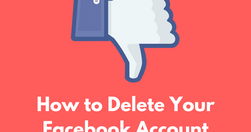
Deactivating your account will ... make your profile invisible. All your messages will still be visible, but you won’t be able to use Facebook’s website to message users. For that, you’ll need to use the Facebook Messenger app.... When you delete your Facebook account, you’ll lose your friend list, your wall, posts, and access to your current Fac…

When I need to focus on a project or relax a bit, I turn off the noise that comes from Facebook ... delete your account... But don’t pretend it will make a difference to Facebook or to the state of the world... if tens of thousands of Americans quit Facebook tomorrow, the company would barely feel it... Its growth has plateaued in the United St…

The episode fits an established pattern of sloppiness towards privacy, tolerance of inaccuracy and reluctance to admit mistakes... the chances of a regulatory backlash are growing... Facebook needs a full, independent examination of its approach to content, privacy and data... role in the 2016 election and the Brexit referendum... Facebook and o…
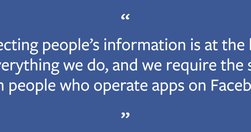
Aleksandr Kogan requested and gained access to information from users who chose to sign up to his app, and everyone involved gave their consent.... In 2015, we learned ... Dr. Aleksandr Kogan lied to us and violated our Platform Policies by passing data from an app that was using Facebook Login to SCL/Cambridge Analytica... Approximately 270,000 …

Wylie ... the gay Canadian vegan who somehow ended up creating “Steve Bannon’s psychological warfare mindfuck tool”.... In 2014 Steve Bannon ... was Wylie’s boss. And Robert Mercer... Republican donor, was Cambridge Analytica’s investor... to bring big data and social media to an established military methodology – “information operations” – then t…
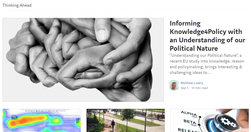
Managing a Medium Publication to share our the journey as we build Knowledge4Policy: "share our experiences … as transparently as possible, and invite ideas and perspectives from experts in evidence-based policymaking around the world"

algorithmic accountability bill... a task force that will monitor the fairness and validity of algorithms used by municipal agencies... include groups and individuals that are affected by algorithms, technology ethicists, city department heads using AI, technology companies as well as legal experts... law enforcement and ... technology companies…

the capacity to spread ideas ... no longer limited by access to expensive... infrastructure. It’s limited instead by one’s ability to garner and distribute attention. And right now, the flow of the world’s attention is structured... by just a few digital platforms:... tincreasingly stand in for the public sphere itself... at their core... They’re …

a similar kind of rumor kept showing up... after each of the man-made crisis events — a conspiracy theory or 'alternative narrative' ... claimed it either didn't happen or that it was perpetrated by someone other than the current suspects... the role that botnets play in disseminating alternative narratives ... What's different about the Parkland …

The record is incorruptible... this sort of recordkeeping is valuable for journalism: it allows us to maintain archives that can’t be censored or altered after the fact... an ad-free publishing economy on Civil’s Ethereum-based platform... Popula is accountable to its readers alone, and is impervious to the interests and agendas of advertisers or…

Blockchain ... creating alternatives to the current corporation owned second layer of the internet... to make quality content truly democratic... Medium ... made itself decentralized... a blockchain with a dedicated token underlying all of the content ... reward content creators... governed only by the rules... But this token would also create an…

in some cases Facebook itself is earning revenue from their false stories... The design of Instant Articles ... obscuring information about a news source that could be used to help evaluate the content... additional false stories are promoted to a reader once they load a single Instant Article from a fake news site... company also specifically fo…

crowdsourced trustworthiness ratings are actually much less effective if they exclude the ratings from people who are unfamiliar with a given site. Which is what Facebook plans to do.. “a lack of familiarity is an important cue for untrustworthiness... Excluding ratings from participants who aren’t familiar with a given news source ... “dramatical…
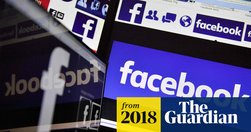
attempts to put a lid on the practice with tweaks to the platform are doomed to failure while the basic business model of a social network is advertising-driven, algorithmically-run and attention-focused.... the entire industry is built to leverage sophisticated technology to aggregate user attention and sell advertising... an alignment of interes…

Facebook will rely on users to rate how trustworthy groups, organizations and media outlets are... Leaving trustworthiness ratings to users without addressing online political polarization risks making civic discourse even more divided and extreme... Facebook needs to take responsibility for the content it publishes and republishes. It can combine…

it will rank news organizations by credibility based on user feedback... trust rankings will emerge from surveys ... Google announced it would cancel a two-month-old experiment, called Knowledge Panel, that informed its users that a news article had been disputed by independent fact-checking organizations... Facebook learned the wrong lesson fro…
discovering a filtering algorithm's existence in a curated feed influences user experience, but it remains unclear how users reason about the operation of these algorithms.... Interviews revealed 10 "folk theories' of automated curation... Users who were given a probe into the algorithm's operation via an interface ... visible hints disclosing asp…
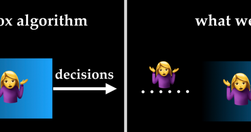
Over the coming years, we’ll see the BBC develop and roll-out more and more machine learning algorithms for storing, retrieving, tagging and possibly even creating content.... What if we lock our audiences in to what they just want to hear, never challenging them? ... Should the algorithms we use be open to public scrutiny?... inform our own thin…

How do we convert users playing the game into users who would complete the survey?... take our readers on a visual journey around the world so they could explore where a news story happened. As a payoff, for every correct answer, the user would collect a stamp in their virtual passport... opted to follow an interesting take on the minimal viable p…

In 2018, we will prioritize News from publications that the community rates as trustworthy... that people find informative... relevant to people’s local community... We surveyed ... people using Facebook across the US to gauge their familiarity with, and trust in, various different sources ...
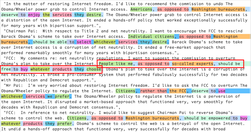
organic, authentic voices in the public debate — more than 99% of which are in favor of keeping net neutrality — are being drowned out by a chorus of spambots.
Relevant Overviews
- Communication Strategy
- Content Strategy
- Knowledge4Policy
- Online Strategy
- Online Community Management
- Social Media Strategy
- Content Creation & Marketing
- Online Architecture
- Digital Transformation
- Change & Project Management
- Blockchain, Crypto, NFTs etc
- Personal Productivity
- Innovation Strategy
- Communications Tactics
- Psychology
- Social Web
- Media
- Politics
- Communications Strategy
- Science&Technology
- Business